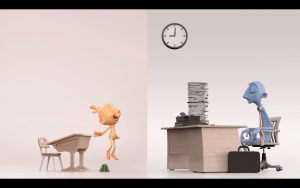When we learned multiplication, one of my classmates discovered he could multiply the top by the bottom OR the bottom by the top and get the same answer.
The teacher made him do his worksheet over.
I watched–and learned–do it her way, or do extra work.
These are the moments that people probably think of when they watch the new Pixar film, Alike. The link I followed made this clear, arguing that the film was touching a cord as it skewers school for making us lose our creativity.
But that’s not what I thought about when I watched this film.
I thought about how I had teachers who fought to teach us science and history in a place (the south) where parents tried to get them fired for doing so.
I thought about my theory of knowledge class–where the very nature of truth and knowledge came under fire–where we were encouraged to debate and to test.
I thought about the encouragement I got from an orchestra teacher when he heard me trying to figure out Flight of the Bumblebee without any sheet music.
I thought about the teacher who circled my cover sheet statement that said 600 words. We had written short stories–the minimum was supposed to be 1000 words. My teacher crossed out her circle after reading the story and wrote “A+ — you couldn’t have added one more word without ruining it!”
I thought about the writing teacher in middle school whose comments were always longer than my papers.
I thought about the teacher who paid out of her own pocket for us all to have our own frog to dissect. Something was coming out of my frog’s abdomen already. I asked what it was and she said, “you’re the best one to figure that out.” (The frog had apparently died of an awful hernia, I discovered.)
I thought about my teachers telling me to learn the rules–before I could break them “prudently.”
I thought about the teachers who forgave me for my chronic lateness–they knew my mom wouldn’t get up to take me to school on time.
I thought about the teachers who listened to me and supported me and encouraged me and basically stood in for the support I didn’t always get at home.
I thought about the teachers who had to deal with us–heartbroken, always–and give advice without reminding us that young love is inherently stupid and dramatic.
I thought about the one teacher who knew I was pregnant the same day I knew (because I told her)–and how she made sure I was always “busy” when it was time to move a piano and who complimented me on the “creative costuming” that let my issue stay hidden until the beginning of the third trimester.
I thought about so many of my university teachers–who managed to open my mind even though I thought I knew how the world worked already.
I thought about the teachers who encouraged me to think.
I thought about the teachers who encouraged me to read.
I thought about the teachers who encouraged me to write.
I thought about the teachers who encouraged me to act.
I thought about the teachers who encouraged me to sing.
Can education, when done poorly, kill your creativity? Yeah.
But I became a teacher because my teachers opened my world. My teachers gave me a future. My teachers saved me.
Everyone who moves on in education can think of a few bad teachers. And a few amazing ones. And that has made all the difference.
And now I’ve become a teacher–because I want not just education that inspires, but a job that inspires me as well.

PS–why isn’t the current critique of this film about the awful work world too?
PPS–even though I think this kid’s artistic side should be nurtured, he does need to learn to write. (Says the writing teacher.)
PPPS–Yes, I’m also the viewer who thinks the English teacher in The Blind Side is not the bad guy!




